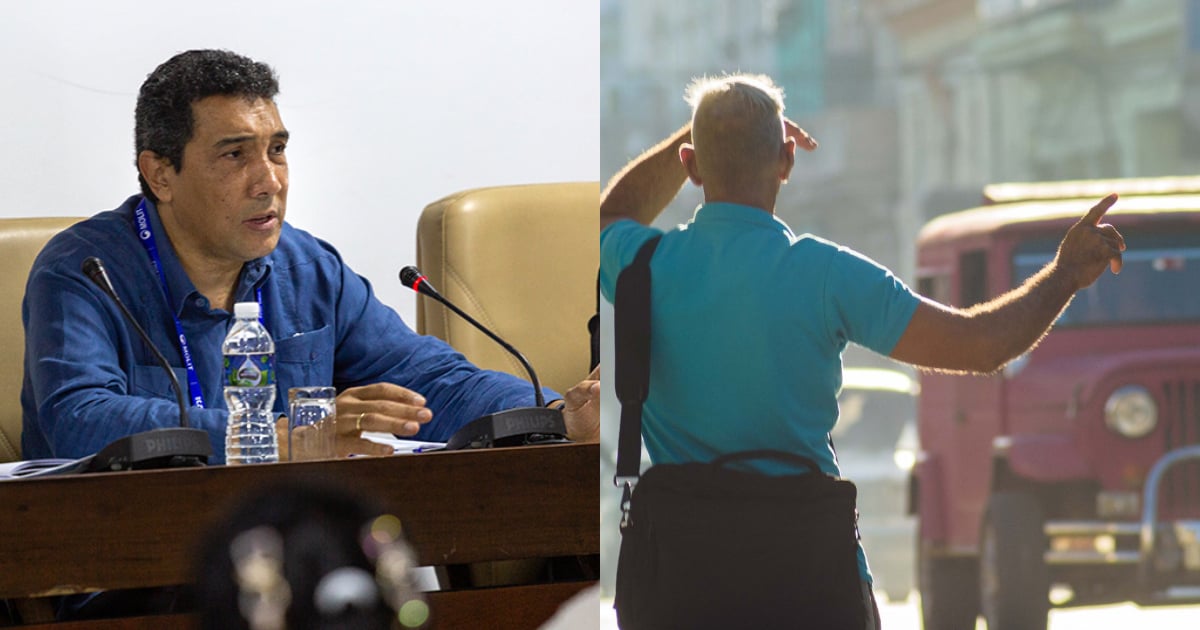Eduardo Rodríguez Dávila, Cuba's Minister of Transport, has publicly acknowledged the dire state of the country's transportation sector, expressing his regrets in a candid self-assessment: "2024 was not the year we dreamed of," he admitted before listing the goals that remained unmet. His statement concluded with restrained self-criticism. "The reality is that we are closing a year where some indicators for various types of transportation in the country were not achieved," he noted.
In a manner typical of the regime's propaganda, Rodríguez Dávila mentioned "achievements," but only in terms of effort, not results. "There has been greater effort across all branches of transportation and throughout the country, with Cuban transport workers showing commitment under increasingly challenging conditions," he stated. It suggests that any positives in 2024 were due to the dedication of these workers rather than any real improvement in public transport, something every Cuban can attest to.
The minister also placed "proposals, initiatives, and process execution" into the realm of effort, expecting these to eventually lead to "projects that will allow us to improve transportation in Cuba." Among the so-called "results" were the expansion of electric tricycles to other provinces, the reopening of some rail services—still far from meeting demands—the slow legalization process of vehicles assembled from parts (VAP), and the update of vehicle sales policies in Cuba, effective January 1st.
Rodríguez Dávila claimed that, as in previous years, particularly with aviation's contribution, significant foreign currency was generated for the country's economy in 2024 by providing airport services that connect Cuba with the world and foster tourism development. However, he did not provide any figures to assess the expected versus actual revenue.
Reflecting on a year marked as one of the most challenging for public transport in Cuba, with airports issuing fuel shortage alerts, the minister expressed satisfaction with the recent establishment of "an early warning network of what is happening in each province and municipality across Cuba." This is a standard practice in public and private transportation management globally, finally reaching Cuba in 2024 after 65 years of communist rule.
Looking Ahead to 2025
Following the typical rhetoric of PCC leaders, the Transport Minister promised that 2025 would be "a year where we overcome obstacles and advance, knowing that the best way to endure is by developing; and when it comes to moving forward, if we don't rely mainly on resources we lack, we must do it at full speed. That is what these complex times demand," he stated, without explaining how progress could be made without fuel.
With textbook cynicism, the minister concluded with a hopeful note: "May 2025 be a year where we continue building dreams, with the readiness and resolve to make them a reality," he remarked, neglecting to address in his post how he plans to move passengers in the country without fuel.
Contrary to what usually happens in such cases, the minister's post received support, with one dissenting voice criticizing the allocation of fuel for Díaz-Canel's December 20th march.
Policy Changes for 2025
The Ministry of Transport's latest measure aims to ease the import, sale, and transfer of vehicles to modernize the automotive fleet and alleviate transportation access tensions. Published in the Official Gazette No. 128 of 2024, this regulation takes effect on January 1, 2025, intending to update a regulatory framework that has been rigid for decades, with the goal of improving transportation management and easing vehicle access. However, while significant on paper, these measures seem insufficient to address the deep-rooted crisis in transportation on the island, characterized by decades of state inefficiency, unaffordable prices, and excessive restrictions.
Key Measures
Property Transfer Flexibility: Vehicle transfer between individuals and entities, including religious organizations and private companies, is allowed, although sales from state entities to individuals require Council of Ministers' approval.
New Tariff Rates: Electric and low-consumption vehicles enjoy preferential tariffs of 10%, while internal combustion vehicles face rates up to 30%, based on category and segment.
Reduced Commercial Margins: The commercial margins for state importers and retailers are capped at 20%, aiming to lower final prices.
Incentives for Electric Vehicles: Priority is given to importing electric cars and their charging infrastructure, with reduced taxes and logistical support for acquisition.
Restricted Access by Frequency: Individuals can import one vehicle every five years, with additional limits on luxury vehicles.
Used Car Sales from Tourism: Vehicles that have completed their tourism rental cycle will be offered in national currency at prices aligned with the secondary market.
Understanding Cuba's Transportation Crisis
What are the main challenges faced by the transportation sector in Cuba?
Cuba's transportation sector struggles with state inefficiency, unaffordable prices, fuel shortages, and excessive restrictions that have persisted for decades.
What measures are being taken to modernize transportation in Cuba?
Recent measures include easing vehicle importation and sales, promoting electric vehicles, and reducing commercial margins to lower costs.
How will the new regulations affect vehicle ownership in Cuba?
The new regulations allow more flexible vehicle transfers, encourage electric vehicle use, and aim to make vehicle ownership more accessible.
